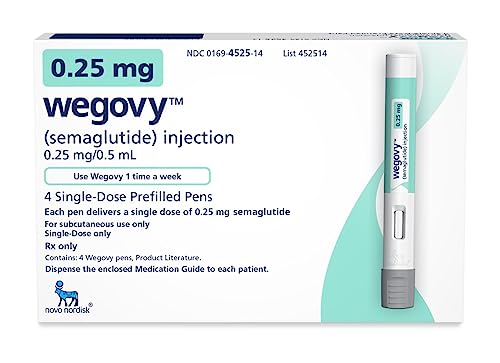
Wegovy
Wegovy is a weekly injection given under the skin, commonly in the abdomen. It is prescribed for chronic weight management in adults with obesity, or overweight with weight‑related health problems, alongside diet and activity. Many people find it helps reduce appetite and supports steady, sustainable weight loss under medical guidance. To find out if it’s the right treatment for you, click on the ‘Start Consultation’ link below and follow the prompts.
Wegovy 0.25mg | 1 x 1.5ml | 498.00€ | |
|---|---|---|---|
Wegovy 0.50mg | 1 x 1.5ml | 699.00€ |
UK ORDERS: Due to post Brexit issues, alternative shipping arrangements may be necessary. Consult with support after order to determine best option.
What you need to know about Wegovy
Semaglutide is a GLP‑1 receptor agonist that reduces appetite, slows gastric emptying, and helps regulate energy intake, supporting significant weight loss alongside lifestyle changes.
Weight management in eligible adults with obesity or overweight with weight‑related comorbidities, according to UK criteria and availability.
Once‑weekly subcutaneous injection using a prefilled pen (abdomen, thigh, or upper arm), on the same day each week. Rotate injection sites.
Titration: 0.25 mg weekly for 4 weeks, then 0.5 mg, 1.0 mg, 1.7 mg, and 2.4 mg weekly as the maintenance dose, if tolerated.
Nausea, vomiting, diarrhoea or constipation, abdominal pain, reflux, headache, fatigue. Serious: pancreatitis, gallbladder disease, dehydration, and rare allergic reactions.
Interdum maximus convallis nam sociosqu pulvinar purus volutpat. Condimentum tortor et nisi blandit diam potenti pellentesque neque. Dis purus suspendisse fermentum letius congue euismod ac laoreet risus fames dui.
If you drink, keep it moderate. Alcohol can worsen GI symptoms and, if combined with insulin/sulfonylureas, increase hypoglycaemia risk.
Wegovy typically produces greater average weight loss than liraglutide 3 mg and is comparable or below tirzepatide in head‑to‑head trials. Once‑weekly dosing is convenient for many patients.
GI intolerance, pancreatitis, gallstones, dehydration. Not for type 1 diabetes or DKA. Avoid in pregnancy; stop at least 2 months before planned conception.
Few direct interactions. It can slow gastric emptying and may affect absorption of some oral medicines. Risk of hypos increases if used with insulin or sulfonylureas; doses may need adjustment.
Patient Information Leaflet, NHS weight management guidance, and your prescriber or pharmacist.
